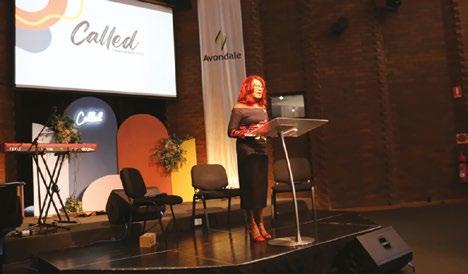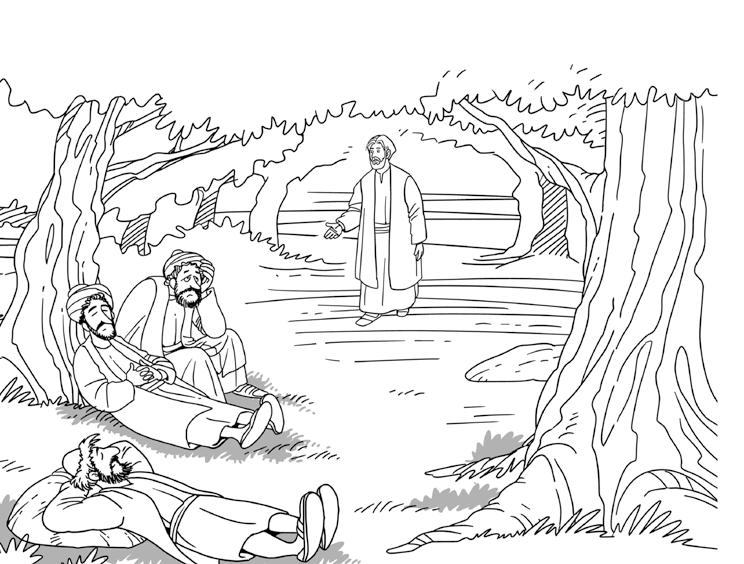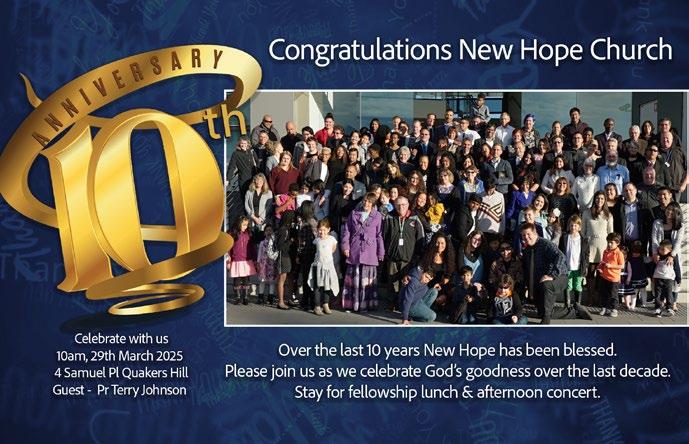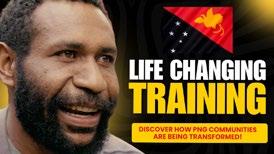We really appreciate it
Thanks a lot I’m grateful

We really appreciate it
Thanks a lot I’m grateful

With more than 170,000 newly baptised members, and tens of thousands more in Bible studies after PNG for Christ 2024, the Seventh-day Adventist Church in Papua New Guinea was facing a very exciting crisis.
In last year’s Camp Mission Offering appeal we invited you to open your hearts and give $400,000 to URGENTLY:
• Expand the Omaura School of Ministry to train more pastors,
• Train and Empower Senior Elders, and
• Run Life-skills Trainings for new members.
Thank you for your kind generosity. You gave more than $600,000 and the work is powering ahead. Classrooms and dormitories are under construction, tens of thousands have attended practical, life-skills training camps and thousands of church elders are being trained in every Mission of PNG.
Thank you for your generous �amp Mission offerings which are already being invested in Papua New Guinea to make a difference for eternity.
WA��H the Report s

READ the Report s

LEARN about the new offering for Fulton’s chapel & missionary training centre in Fiji s


EDITOR’S
NOTE:
Jarrod Stackelroth Editor
Let the heart be continually uplifted in silent petition for help, for light, for strength, for knowledge.
Some time ago, my mum gave me a book on prayer called A praying life by Paul Miller. This is not the sort of book I usually read. I’m happy to read faith-based books and devotional type books but the design and the general impression of the book itself made me feel like this wasn’t the book for me— more self-help looking. Yes, I judged the book by its cover.
Prayer is also something I don’t think should be formulaic. The Bible warns against “vain repetitions” or as the NIV puts it “babbling like the pagans” (Matthew 6:7). This could be why, as Adventist Protestants, we don’t have a very strong tradition of prayer ritual or liturgy (something I appreciate more the older I get is that praying passages of the Bible regularly can be helpful). Personally, prayer is something I’ve struggled with a little. Of course, I pray. But I’ve never found “how to pray” manuals or articles very helpful. Prayer is more visceral for me. I wouldn’t classify myself as a prayer warrior and pray best when I’m under the pump.
All of this considered, it took me quite some time from receiving the book until picking it up again. However, when I started reading it, I was pleasantly surprised.
I was encouraged to start becoming more serious in my prayer life. The author shares many personal stories about situations in his life that have changed with prayer (or how he himself has changed in response to praying about the situations).
The book contained some ideas on systematising prayer so that you could keep track of developments and give praise for the things that prayer changes in your own and other people’s lives. I intend to develop some prayer cards for myself to help keep track of specific prayer points and requests that I have.
I’ve kept a very haphazard journal habit through the years. I often don’t prioritise the habit but when I feel down or am struggling to reflect or make progress on something, I find that writing it down is cathartic and critical in processing it. These journal entries often take the form of prayer, as I don’t expect anyone to read them, but I know God knows what I’m wrestling with. Because God knows us and our thoughts (see 1 Corinthians 2:11).
Last year I started to become more serious about this, adopting a habit called morning pages. I try to spend 15 minutes in the morning to write and reflect on what is happening in my life. It helps me to put things in perspective. It is also nice that it is writing that will never be read by anyone, very different to writing for publication. It is part of my morning routine and my chance to connect with God early in my day.
As Christians, we need prayer in our lives. There are many metaphors and cliches out there about prayer, but I liked this reminder from Miller.
“We don’t need a praying life because that is our duty. That would wear thin quickly. We need time to be with our Father every day because every day our hearts and the hearts of those around us are overgrown with weeds. We need to reflect on our lives and engage God with the condition of our souls and the souls he has entrusted to our care or put in our paths. In a fallen world these things do not come automatically” (p267).
It reminds us that intentionality is important. Ellen White, church founder and prolific writer, had this to say about prayer.
“Cultivate the habit of talking with the Saviour when you are alone, when you are walking, and when you are busy with your daily labour. Let the heart be continually uplifted in silent petition for help, for light, for strength, for knowledge. Let every breath be a prayer” (Temperance 135).
Of course, she is only expanding on the apostle Paul’s admonition to “Pray without ceasing” (1 Thessalonians 5:17).
How can you strengthen your prayer life and cultivate that habit in the busy and noisy world we live in? Let’s commit together to look for opportunities to live a praying life.

I was blessed to spend time in worship and sharing with some of our Indigenous church members at our national ATSIM (Aboriginal and Torres Strait Islander Ministries) Camp at Watson Park, Qld. Several people I spoke to expressed their disappointment about their Church’s apparent silence in response to the Voice referendum and its aftermath. Some told me about how they or their family members have chosen to not attend their local church or other church events; that they have felt unsafe in some church situations; and have been deeply hurt by statements made by fellow church members, in person and on social media.
I admit we made some mistakes in how we worked through the implications of the referendum, while actively allowing for liberty of conscience in the voting

We are seeking church members who have a strong commitment to the mission and values of the church and who wish to contribute to that mission through service on a governing board or committee for the next quinquennium (2025 – 2030).
If you have expertise and experience in professional disciplines such as governance, risk management, human resources, change management, finance, actuarial science, marketing, health, media, WHS, legal, logistics, manufacturing, education and international development, to name a few, or have life experience and a passion to serve, we invite you to register your interest by clicking the link below.
or

Bridcutt
An initiative that fosters partnerships between conferences and missions across the South Pacific is yielding encouraging results.
Established 20 years ago, Partners in Mission is experiencing a renewed focus, aiming to strengthen collaboration, resource sharing and mutual support between conferences and missions.
To encourage active participation, the South Pacific Division (SPD) invited each conference-mission partnership to report on their achievements in 2024. A financial incentive of $A5000 per report was offered to be shared between the partners. The best overall report would receive an additional $5000, while the runners-up prize was set at $3000.
In February, the SPD announced the winners. Best Partnership Reports were awarded to North New Zealand Conference and Bougainville Mission; South Queensland Conference and Morobe Mission; South Queensland Conference and Vanuatu Mission.
Greater Sydney, with its partners Solomon Islands, Cook Islands and American

Samoa Missions, shared the runners-up prize.
Partners in Mission supports a variety of collaborative activities, including prayer partnerships, resource sharing, exchange visits, training and mentoring.
During the 2024 PNG for Christ campaign, a number of conference leaders and pastors visited and preached in their respective partner areas, reinforcing connections and gaining firsthand experience of the ministry work on the ground in these territories.
Other partnerships have been established between: Victorian Conference and Samoan Mission; Victorian Conference and New Britain and New Ireland Mission; South New Zealand Conference and New Caledonia Mission; Western Australian Conference and Northern and Milne Bay Mission; North New South Wales Conference and Fiji Mission.
“We are very thankful for the active participation taking place across the region,” said SPD secretary Pastor Mike Sikuri.“ Together we are stronger.”
Stuarts Point, NSW | Ashley Jankiewicz
A total of 732 young people from across Australia gathered at Converge— an annual Adventist youth conference held this year from February 7 to 10—to worship, connect and grow in their faith.
Held at Yarra Holiday Park, the event included worship programs, presentations and water sports, as well as time to mingle and go to the beach.
Converge began nine years ago with the theme “hang out with Jesus and your mates”, designed for young people to connect with others, an aspect that Australian Union Conference youth director Pastor Jeff Parker said is just as important as the worship services. He explained that the event is also the place where young adults can lead. “You’ll notice it’s all been young adults up the front. We step back and want them to step up and lead their fellow young adults. That’s really what it’s all about.
“Converge is a really powerful event
to introduce Jesus to the 15-20 per cent of attendees we believe are not involved in church, but just attended with their friends,” added Pastor Parker.
Programs held morning and evening featured praise and worship and talks from the main speaker, South Queensland Conference pastor Lachlan Campbell, on discipleship and mission.
“There’s been a real call to action this year at Converge. Like, just go do something, whether it’s go serve, go to Converge, go to Avondale or go love your neighbours,” said Pastor Campbell.
Converge also offered presentations on initiatives in which young people can get involved.
Attendees described the event as “enriching”. According to Avondale theology student Keanu Hodges, Converge was a place to “share in an experience of knowing Jesus more and learn different ways to live a life of a disciple”.

Fiji | John Tausere/Record staff
Fulton Adventist University College (FAUC), in Fiji, has partnered with Southern Adventist University (SAU), in the US, to offer a new Certificate in Digital Communications & Media course starting in August. This groundbreaking program was formalised through a Statement of Understanding signed late last year.
Southern Adventist University, based in Tennessee, will provide undergraduate courses in communication and media on behalf of FAUC and the Trans Pacific Union Mission (TPUM).
“FAUC is committed to offering this new pathway in communication to students throughout the Pacific, empowering them with the tools needed to become leaders in media and communication,” said FAUC principal Dr Ronald Stone.
Courses will include Writing for the Media, Communication Theory, Social Media Strategies, Studio Production, and Media Management and Ministry, among others. These will primarily be offered online, with a few modules conducted face-to-face on campus at FAUC.
“The program aligns with the growing

need for skilled media professionals in the TPUM and will help fill the gap in communication training for those interested in working with media ministries at the local missions such as Hope Channel and Adventist World Radio,” said John Tausere, former communications and digital media coordinator for TPUM.
SAU is a well-established institution that has been providing quality education since 1892. The university is accredited by the Southern Association of Colleges and Schools and the Adventist Accrediting Association. Southern offers a range of degree programs, including doctoral, master’s, baccalaureate and associate degrees, with various delivery options such as face-to-face, online and hybrid formats.
“This partnership offers a unique opportunity for Pacific islanders to develop skills in media and communication, preparing them for roles in the digital age, serving in communication and media ministries at their local churches and missions,” said Dr Stone.
Wahroonga, NSW | Tracey Bridcutt
The ELIA Lifestyle Medicine Centre has announced a new partnership with ACA Health as part of a government-approved pilot study focused on the treatment and prevention of diabetes.
With 1.45 million Australians living with diabetes in 2023—a figure that has surged by 220 per cent since the year 2000—the urgency for innovative treatment approaches has never been greater, according to Dr Andrea Matthews, medical director of the ELIA Lifestyle Medicine Centre (ELIA LMC).
Traditionally considered a chronic, irreversible illness requiring ongoing medication, type 2 diabetes is being redefined by leading organisations such as Diabetes Australia, Diabetes UK and the American Diabetes Association, which acknowledge that remission is possible.
As an Adventist Health initiative, ELIA LMC will be able to accept study participants who are ACA Health Benefits Fund members based in Sydney and surrounding areas, and who have prediabetes or type 2 diabetes. Eligible participants will engage in the ELIA 12-week Diabetes Clinical Program, designed to provide a wholistic, evidence-based approach to diabetes management.
ACA Health executive director Jody Burgoyne said the health fund is proud to partner with ELIA LMC in this initiative. “By working together, we can offer members greater support, education and resources to manage their health more effectively,” she said.
For more information on the ELIA Diabetes Clinical Program, visit <elialmc. com>.

Cooranbong, NSW | Tracey Bridcutt
Around 190 women from across the South Pacific Division (SPD) gathered at Avondale University for the “Called” Women in Ministry and Leadership Conference from February 17 to 20.
Held every five years, the conference serves as a key platform for networking, encouragement and professional development for women serving in ministry.
SPD associate ministerial secretary Dr Edyta Jankiewicz highlighted the significance of the gathering. “The goals of this conference are to bring women together for conversation, support and networking,” she said, “but also just to reaffirm their calling to ministry and to help them to know that they’re not alone, that there are other women all across the Division also labouring, some of them in really challenging situations, where there’s not a lot of support from the community for female pastors.”
Among the keynote speakers was Dr Hyveth Williams, professor of Homiletics at Andrews University, who has spent more than four decades in ministry. She delivered impactful presentations on resilience in ministry. Dr Tara VinCross, senior pastor at Azure Hills Adventist Church in the Southeastern California Conference, presented the evening messages under the theme “Deep Calling”, covering rest, healing and blessing.
Greater Sydney Conference chief financial officer Nadelle Manners engaged the audience with insightful leadership advice. In addition to the keynote presentations, participants engaged in morning worships and afternoon workshops. Attendees also had the opportunity to explore exhibition booths showcasing various ministries including the 10,000 Toes Campaign and Mums At The Table.
Participants have expressed deep appreciation for the conference’s impact. Central Papua Conference children’s ministry director Ruth Batu shared, “The Called conference has affirmed the calling for women in ministry and helped leaders to be equipped with the tools to go back and empower their churches.”
Concluding the event, Dr Jankiewicz encouraged church members to continue to pray for all women pastors who serve across the Division.
ADRA is holding art therapy workshops for children at its Protection and Support Centre in Kyiv, Ukraine. They hope to help children learn to express emotions and influence their emotional state through behaviour. A recent workshop’s theme was “Giving Joy With Love”, and the children created cards and discussed the feelings around giving handmade gifts.—ANN

A total of 275 inmates were baptised at the Khami Prison in Zimbabwe as a result of Adventist discipleship programs intended to cultivate spiritual renewal among prisoners. Upon baptism, each inmate was gifted a Bible, and many shed tears of joy at the symbolism of leaving their old lives behind and embracing the new.—Bulawayo24News
For the third consecutive year more than 100 student literature evangelists in Uruguay have spent a summer sharing hope through Christian literature around the country. As a result, there are already 97 people studying the Bible and four Bible instructors who have been financed to continue evangelising across the country.—SAD
Researchers have discovered how dietary fibre helps lower blood pressure: by activating protein receptors in the gut which trigger anti-inflammatory mechanisms. Lack of fibre increases gut permeability, which increases inflammation in organs, resulting in hypertension. This study highlights fibre’s role in heart health and researchers are now testing new ways to reduce hypertension.—Monash

Ellen G White Estate leaders visited Australia from February 11 to 16, touring historical Adventist sites and meeting with church heritage leaders. The White Estate, headquartered at the General Conference office, in the United States, is responsible for preserving and promoting Mrs White’s writings. White Estate director Dr Merlin Burt and vice-director Dr Tim Poirier used their trip to Australia to explore key locations connected to Ellen White’s time Down Under. During their visit, Dr Burt and Dr Poirier toured Ellen White’s former residence in Granville, Sydney, and Sunnyside, her historic home in Cooranbong. They commended Adventist Heritage for their restoration efforts, particularly in preserving artefacts from Mrs White’s time in Australia. At Avondale University, a lunchtime gathering brought together former directors of the Ellen G White Research Centre, who reflected on their experiences and Mrs White’s ministry. Reflecting on the experience, Dr Poirier described the visit as “a significant moment in his career”.—Mark Pearce/Juliana Muniz

Youth leaders from across North New Zealand Conference (NNZC) gathered at Tui Ridge Park from February 14 to 16 for Gear Up, a leadership training event designed to equip Pathfinder, Adventurer and youth ministry leaders with practical skills and spiritual encouragement.The weekend featured keynote presentations, workshops, networking sessions and worship services, providing leaders with tools to support their ministry roles. “Gear Up was an opportunity for leaders to grow together, share ideas and be encouraged in their ministry”, said Pastor Keli Pepa, NNZC youth director.—Record staff

Three shipping containers carrying materials for the construction of the new Kerenda Adventist mega-church arrived in Imbongu District, Southern Highlands Province, PNG, on February 6. The project, initiated by the Olgei Welai and Wagomai tribes, aims to establish a new place of worship for the local church community. Church members and community representatives gathered to welcome the containers with a procession. The next phase of the project will involve construction efforts led by the local church and community.—Harry Nasi

A dental clinic is set to open at Atoifi Adventist Hospital, Solomon Islands, by the end of the month. Construction began in February after building materials arrived in a 12-metre container from Honiara. The dental clinic is being funded by Dr Genna Levitch, a dentist, and his son-in-law, Tim Edwards, from Australia. The funds have been channelled through ADRA Australia and will be administered by ADRA Solomon Islands.—Denver Newter/Record Staff

Thirty-five staff, students and recent alumni of Brisbane Adventist College (BAC) were baptised or joined the Seventh-day Adventist Church in 2024.
This number includes 18 current students, 14 recent alumni (who had graduated within the past four years), five current staff members (three of these staff are recent alumni too) and one regular relief teacher.
The BAC chaplain team Annalise Cherry and Jean-Pierre Martinez said, “We are deeply grateful and excited to witness how God is moving within our school community.”
The school chaplaincy team held two “Baptism and Praise” events during the course of the year, during which eight students were baptised. Two staff members were baptised at a Pathfinder camp, attended by many BAC students.
The chaplains pay tribute to the importance of school and conference mission alignment. One of the girls who was baptised had been spiritually mentored by Pastor Cherry, starting at Junior Camp, right through Bible studies at high school, up to her baptism in the Youth Tent at South Queensland big camp. “It was a teary and emotional moment, and was a longtime coming as they studied the Bible over previous years,” said Pastor Martinez.
Pastor Martinez has been supporting one of the primary students who was baptised, helping him get involved at a local church, with the support of the student’s family.
“What a God we serve! He’s on the move!” said Pastor Martinez.—Jarrod Stackelroth
have news to share?
Send info and photos to <news@record.net.au>

The Western Highlands Mission (WHM) celebrated the dedication of a new office complex in Mendi Town, Southern Highlands Province, Papua New Guinea, on January 16. The five-year project, valued at nearly two million Kina, was described as a “faith project” by church leaders. PNG Union Mission president Pastor Malachi Yani led a dedication prayer and highlighted the complex’s role in ministry and administration. During the event, J-Mali Finance donated a truck to the church and Ipwenz Construction pledged another vehicle. The ceremony concluded with a ribbon-cutting, speeches and a thanksgiving celebration.—Ronald Luke

The New Britain New Ireland Mission (NBNIM) in PNG conducted a New Disciple Retention Training program from February 9 to 13 in Kimbe, Rabaul and Kavieng. The training focused on nurturing and retaining new disciples, and equipping church leaders with strategies for effective disciple-making. A total of 209 participants, including field pastors, ministers, Volunteer In Action workers and local church leaders, attended the training facilitated by NBNIM administrators and departmental directors, using materials developed by the South Pacific Division Discipleship Ministrries team. The training covered key topics such as the importance of nurturing new disciples, the role of the local church in disciple-making and effective methods for retention and spiritual growth. Facilitators adapted content to the local context, training participants in strategies for strengthening new members in their faith.—Paul Bopalo

Have
checked
It’s around midday on Monday, and I have just met up with Rabbi Mendy for lunch at a café’ in Melbourne for a Kosher meal. Rabbi Mendy is the rabbi for the Jewish South Caulfield congregation and secretary for the Rabbinic Council of Victoria, Australia. The reason for the meeting is to express our concern regarding the rise in antisemitism in Australia, to offer support and stand in solidarity with our Jewish friends.
We looked through the menu, placed our food order and waited. While we waited, I asked Rabbi Mendy about the upsurge in antisemitism in Australia, and he shared that recently the Jewish community in Australia had been targeted with discrimination, insults, vandalism, violence and acts of terror. This is obviously concerning as it has brought fear and anxiety to many Jews in Australia who just want to go about their daily business. It became clear during our conversation that worshippers attending synagogues on Sabbath were also concerned for their safety and security had to be provided to synagogues and at schools. This is regrettable for a society that seeks to foster cohesion, equality and tolerance.
Before long our meals arrived and Rabbi Mendy offered a Jewish prayer in thanksgiving for our food. As we dug in, I asked Rabbi Mendy about how Seventh-day Adventists could support the Jewish community at this unsettling time. He indicated that vague statements of support were less effective than actively calling out antisemitic behaviours in the community. He mentioned how much his community had appreciated the support of fellow Australians who spoke out against hostility towards Jews. Further, he observed that most people are not antisemitic but often choose to remain silent in the face of antisemitic behaviour.
As we paused while eating, Rabbi Mendy reminded me that as people “we have more in common with each other than

what divides us”. Our shared humanity is a common denominator that calls us to empathise with those who are suffering. However, as Seventh-day Adventists we have a calling that transcends our shared humanity. As a people who are called to actively reflect the love of God, we care about the way people are treated in our society, and we endeavour to reach out to them in kindness and love. The unspoken reality is that a threat to the Jewish faith community is a threat to our faith community.
We finished our meal and exited the café. We bid each other farewell and promised to keep in touch. You may be surprised at how grateful your Jewish neighbour will be when you reach out to them. On the other hand, we may be the ones who end up being surprised when the King says to us, “‘I tell you the truth, when you did it to one of the least of these my brothers and sisters, you were doing it to me!’” (Matthew 25:40).
Kojo Akomeah Public affairs and religious liberty director, Australian Union Conference.
Stefania thought her trip to Hungary would be easy. One beautiful spring morning, she boarded a bus, waved to her daughter and son-in-law, and set off on a journey that took her across the then-Yugoslav border into Hungary. The trip wasn’t long, and with cheerful anticipation, she gazed through the window at new landscapes she'd never seen before. She carefully noted where she got off the bus so she could find her way back later that day.
Although she didn’t know the Hungarian language, she hoped she would manage to communicate with the locals, as happened with various foreigners who visited her hometown in the summer. But trouble awaited her.
She navigated the town well, gradually ticking items off her shopping list. She regularly checked the time and was cautious about how she moved through the streets of the unfamiliar town.
Pleased with her purchases, she decided to head back to the bus station early. For the first time that day, she was a bit worried and quickened her pace. What would she do if she missed the bus? She didn’t know the language, didn’t know anyone and had no more money. When she reached the spot where the bus had dropped them off that morning, she didn’t see anyone else waiting. As the departure time approached, she grew concerned when none of the other passengers arrived.
She looked up and down the street to see if anyone was further away but wherever she looked, she didn’t see any of her fellow travellers or the bus. She tried asking locals, but since she didn’t speak Hungarian, no-one could help her.
The departure time was fast approaching, and she still hadn’t seen anyone. What was she to do? Her small worry had now grown into a significant concern. At that moment, an older woman approached her. She looked kind, modestly but neatly dressed, with a scarf on her head—just the way Stefania dressed. The woman walked straight toward her and gestured for her to follow.
Having no other option, Stefania followed the woman. They crossed one street, then another, turned a corner and went a bit further. And behold! They arrived at the place where the other passengers, who had come with her on this day trip, were waiting for the bus.
Relieved, Stefania felt a weight lift off her shoulders. Since the woman had been so kind, Stefania used gestures to ask her to watch her belongings while she went to the restroom. The woman agreed to stay with her bags.

Pleased everything had worked out, Stefania turned around to the kind woman to thank her. But the woman was gone.
She asked nearby people, “Where is the older woman who was here watching my things?”
“We didn’t see any woman here,” they replied.
Dissatisfied, she tried again.
“We came here together. She wore a scarf on her head and was about my height. I asked her to watch my things, and now she’s gone. I wanted to thank her.”
“Madam, we’ve been here for a while, and no-one else was here. We saw you, but we didn’t see any other woman.”
Surprised by their response and the situation, she realised there was only one thing left to do. She focused her thoughts heavenward. Thank you, God, for looking after me and for giving me this beautiful opportunity to see my guardian angel with my own eyes!
Now she had much more to share with her family than the items she had purchased that day—a life-changing experience with her angel that would inspire her for the rest of her life.
Known as Štefica Bratulic (1930-2020), Stefania was my mum. She shared this story many times. Her doctor also saw her angel, a story you can read at <record.adventistchurch.com/2021/04/15/doctor-you-sawmy-angel>.
Dr Danijela Schubert an author who worked as a lecturer, theologian, church administrator and departmental leader.


It can be tough to find recipes that you know your family will love, while also being convenient, budget-friendly and packed with nutrients to boost your health.
Our Sanitarium dietitians share their tips on how to identify a healthy recipe, nutritionally balance your meals and understand how to substitute ingredients for more nutritious options to transform your cooking. For instance, swapping refined grains for whole grains, choosing plant-based and lean proteins, and incorporating a variety of fruits and vegetables into your meals can increase the fibre, vitamins and minerals in your diet without sacrificing flavour.
A balanced diet is built on five essential food groups: Fruits
Vegetables
Grain foods, especially wholegrains like wholegrain bread and breakfast cereals like Weet-BixTM, brown rice, quinoa or wholemeal pasta
Proteins, like legumes, tofu, nuts, seeds and eggs
Dairy, including milk or calcium fortified plant-based milk alternatives like So GoodTM, yoghurt and cheese
It’s also recommended to include healthy fats in your meals, like extra virgin olive oil or other vegetable oils, nuts and avocado.
Each group plays an important role in providing the nutrients your body needs to function at its best. While you don’t need to find all five groups used in every recipe, considering them when planning your weekly menu can help ensure you choose recipes that promote a balanced, well-rounded diet rich in goodness.

There is no better time than now to focus on making informed food choices. By taking small, intentional steps, you can set the foundation for a healthier lifestyle that benefits you long term.
When choosing a recipe, consider the following factors:
• A balanced plate: Look for recipes that include a variety of food groups as recommended by dietary guidelines. As a guide, you want to aim for at least ½ of your meal to be made up of vegetables or salad, ¼ of your meal to be made up of grains or starchy vegies like potato and ¼ to be made up of protein-rich foods.
• Plant-based extras: If a dish doesn’t contain any vegetables, serve a smaller portion then add half a plate of salad or vegetables. Consider delicious plant-based sides like a salad or slaw to enhance your meal.
• Nutritional balance: Look for main meal recipes with fibre containing ingredients like legumes (peas, beans, lentils) or wholegrains such as wholemeal bread, rice and pastas. To identify recipes likely low in saturated fat, look for dishes with healthy fats such as olive oils, avocado, nuts and seeds. Choosing recipes lower in sodium is also important to help look after your heart health. Aim for dishes using herbs, mild spices, lemon juice or vinegars to enhance flavours.
For more information and research references check out the full article on the Sanitarium website.



Around five years ago, the Taumarunui Seventh-day Adventist Church (Taumarunui, New Zealand) members sought to connect more deeply with their community, realising that while many locals knew each other in their small town, few attended church regularly. This inspired the creation of a monthly community lunch.
On the third Sabbath of each month, the church relocates its services to the Senior Citizens Hall in the town centre, as their church building has no kitchen or hall space. The community hall provides an ideal setting with ample space, a wellequipped kitchen and a pleasant view of a nearby park. Through the newspaper and social media, the church invites the community to join them at 1pm for a free meal.
Led by coordinators Simone Johnston and Dy Smith, along with Jenny and Frank Mariu, Heath Johnston, Morris and Vera Gunn, Pastor Phil Laws and others, the team plans a nutritious menu each month. They prepare and serve food for 30 to 40 people in a warm and welcoming environment. The effort has strengthened bonds among church members as they organise, set up, clean and welcome guests.
While some community attendees have later joined church services, the primary goal is to serve the people and through that, show Jesus.
“Serving others is a blessing to the visitors and an event they look forward to and the service provided by the church members has worked to serve the givers,” Simone Johnston said.
“It’s a big undertaking for a small church group, but God promises blessings when we serve others, and He has not disappointed yet!”
Lynelle
Laws
Partners in Ministry, women’s ministry and prayer ministry coordinator, North New Zealand Conference.
Previously I wrote an article titled “Redefining Church” (November 2) where I looked at the origin of the word church in its original cultural context to see if we could discover a layer of new insight hidden under layers of meaning added over the many centuries since the Bible was written. This is often how language works. Over time usage and meaning changes. Just like someone restoring an old car which has been repainted many times will need to carefully strip back layers if they want to discover the original colour, when we read the Bible, it is important for our understanding of the text to sometimes strip back layers of meaning added over time in order to bring out the original colour and context of meaning and bring it back to light.
One such important word is central to our faith. In fact, it is that word: faith or belief.
For so many of us the word faith can be used to describe a religion someone belongs to, ie “that person belongs to the Adventist faith” or simply a system of beliefs/practices, ie “that person has the same faith”. The word belief is another word which is used to describe a set of statements which someone agrees with, ie “I won’t work on Sabbath because it is against my beliefs.”
These definitions often play themselves out in our discussions as Christians and Adventists when discussing how someone is saved. Someone will often quote the famous Scripture passage John 3:16—that someone only needs to
believe—but then someone will respond, that is not enough, you also need works because as James says, “faith without works is dead” and “even the demons believe” yet they are not saved.
The problem is this argument misses an important facet of what this word meant in its original context. We need to redefine and rediscover these words— not through the lens of 2000 years of Christian history, but with the culture, language and time in which they were written.
The first point to note is that the biblical words faith and believe in the NT are the same word. One is simply the noun and the other the verb of the same word. In Greek they are the following words,
Faith: pistis (noun)
Believe: pisteuo (verb)
Another way to put it, faith is the quality of a person who believes, ie they have faith/belief. Wherever you see the word faith, you could easily replace it with the word belief. To believe is the action of employing or acting on that belief.
Often when we think about what it means to believe, we simply think of agreeing with something or thinking something is true. For example, “I believe Michael Jordan is the best basketball player that has ever lived.”
This example is not what the word really means though, as that is just an opinion. There is no real concrete action or implication of that belief in my life.
To have faith or believe something means that something is unequivocally true and, further, that this truth is a guide to my entire life and determines my actions.
A good example of this is to say “I believe (or have faith) that the sun is hot and can damage my skin if I spend too long in the sun during summer without protection.”
This is not just an opinion but a fact based on experience and my belief is shown in how I behave. If I said I believed that but went out in the direct sun for extended periods without any protection and kept getting badly burnt, you would question if I really believed it at all.
This is why the writer of Hebrews defines faith as:
“Now faith is the assurance of things hoped for, the conviction of things not seen” (Hebrews 11:1, NASB95).
Most translations of this verse are problematic because they weaken the meaning of some of the words. The word assurance really means substance or the very tangible reality of something and the word conviction actually means evidence. A better way to translate it would be:
“Now faith is the [very reality] of things hoped for, the [evidence] of things not seen” (Hebrews 11:1, my words in brackets).
The writer of Hebrews is saying that faith is not just an opinion about a topic, it is the lived experience of a reality that guides your life and actions.
So coming back to the point which James makes in talking about faith. He is simply stating the reality of what faith is, not giving a new definition. Faith results in works or actions because it is the very framework of how you know and understand the world to be and the basis for how you determine what you do.
If I believe the sun can cause damage, I will do something to protect myself from it. If I don’t protect myself, I don’t really believe it at all; I am lying to myself.
There is a fundamental difference to believing a fact about someone and believing in them. For example, I could say that I believe someone is the head elder of the church—this is simply agreeing with a fact about them. It would mean something else entirely for me to say that I believe IN my head elder. That belief would indicate that I would place my trust in that person in the way I interact with them.
There is a fundamental difference between what James in 2:19 says and what John says in 3:16.
Let’s compare the two:
“You believe that God is one. You do well; the demons also believe, and shudder” (James 2:19, NASB95).
““For God so loved the world, that He gave His only begotten Son, that whoever believes in Him shall not perish, but have eternal life” (John 3:16, NASB95).
James says they believe that God is one, ie that God exists. That is completely different to believing IN God and IN His Son. What is implicit in John 3:16
in believing in Jesus? We believe God loves us enough to sacrifice His own Son for us, to redeem us and give us eternal life and to restore His image in us.
Believing IN = Trusting IN, having Faith IN.
Is it enough to believe in Jesus? Is it enough to believe in God? Well, when we understand the full meaning of these words and what it means to have faith and trust in God and all He is and all He has said—we will base all of our decisions and actions on this belief and commit to enter into a partnership with Him for Him to restore His image in us.
In John 6, Jesus has interaction with those who He had fed miraculously. This is what they ask Him and how He answers: “Therefore they said to Him, ’What shall we do, so that we may work the works of God?’ Jesus answered and said to them, ’This is the work of God, that you believe IN Him whom He has sent.’” (John 6:28,29, NASB95, emphasis added)
And further He says to them: “For this is the will of My Father, that everyone who beholds the Son and believes in Him will have eternal life, and I Myself will raise him up on the last day” (John 6:40, NASB95).
Believing IN Jesus takes on new meaning when we understand that the word “believe” does not just mean an agreeance with some abstract concept. When we understand that it is an entire, complete trust in who someone is to the point you will base your entire life on what they say and who they are. It becomes something that requires significant effort for us to do. It means to follow Jesus with everything we are and impacts every decision and action. As Jesus told us, “If anyone wishes to come after Me, he must deny himself, and take up his cross and follow Me” (Matthew 16:24, NASB95).
So as John wrote, “For God so loved the world, that He gave His only begotten Son, that whoever believes in Him shall not perish, but have eternal life” (John 3:16, NASB95).
And I believe it. Will you?
Matthew Hunter pastor, College Park and Birdwood Adventist churches, South Australia.
Life is filled with moments of joy and moments of hardship. At times, suffering can feel overwhelming, and we may question why we experience pain and loss. However, the story of Job in the Bible provides a powerful example of certainty and endurance. Job's trials reveal God’s sovereignty, strength and ultimate faithfulness, demonstrating that even in our darkest moments, we can trust His divine plan. Reflecting on Job’s experiences and my journey, I have realised that God’s promises remain steadfast, offering comfort in loss, strength in suffering and redemption in times of doubt. Imagine losing everything you have worked for in a single moment. Job, a righteous man, faced unimaginable loss when he lost his wealth, children and health. Yet, instead of cursing God, he chose to worship Him, declaring in Job 1:21, “I came naked from my mother’s womb, and I will be naked when I leave. The Lord gave me what I had, and the Lord has taken it away. Praise the name of the Lord!”
Job’s response reflects an unshakable reliance on God’s power, even when everything was taken from him.

I experienced a similar grief when I lost my grandmother while I was far from home. My family and I had planned a trip to Australia from Samoa at the end of January 2022, and before we left, my grandmother, who was in good health, tearfully told us that she feared she might never see us again. We reassured her that we would return. However, just two to three weeks into our trip, we received the heartbreaking news that she had passed away on New Year’s Day. I remember the pain and confusion that overwhelmed me, questioning why this had to happen while I was away.
Like Job, I struggled to understand the loss. Although I mourned, I gradually understood that God's plan extends beyond my limited perspective. I saw He was still present, providing comfort, strength and unexpected blessings over time. Though I didn't have all the answers, I began to trust that His purpose was greater than what I could see at that moment. God’s sovereignty assures us that nothing happens outside of His knowledge and ultimate plan, and even in hardship, He is working for our good. Romans 8:28 reminds
us, “And we know that in all things God works for the good of those who love Him, who have been called according to His purpose.” Even in our losses, we can trust that God’s ultimate plan is for our good.
Pain can break even the strongest individuals. Job not only lost his wealth and family but his physical health was also afflicted with painful sores. It became so intense that his wife urged him to curse God and die (Job 2:9). Yet, despite his unbearable pain, Job remained steadfast, replying, “Should we accept only good things from the hand of God and never anything bad?” (Job 2:10). His response serves as a reminder that our faith should not waver based on circumstances.
In my own life, I have struggled with feelings of inadequacy and self-doubt, particularly in my academic journey. Throughout high school, I was highly competitive, pushing myself to achieve excellence. I studied diligently, aiming to be at the top. However, there were times when I fell short of my expectations. I blamed God when I did not receive the results I had hoped for, questioning why my efforts did not yield the success I desired. Over time, I realised that my understanding was limited. Proverbs 3:5,6 teaches us to “Trust in the Lord with all your heart and lean not on your own understanding; in all your ways submit to Him, and He will make your paths straight.”
My academic struggles were not a sign of failure but an opportunity to trust God’s wisdom and guidance. Just as Job remained true despite his misery, His promise to guide us is unwavering, and He always provides what we need when we surrender our struggles to Him.
One of the most painful aspects of Job’s hardships was the isolation he experienced. Instead of comforting him, his friends accused him of wrongdoing and believed his despair was a punishment for sin. In Job 19:2, he cried, “How long will you torture me? How long will you try to crush me with your words?” Even in his despair, Job refused to abandon his trust in God’s justice and questioned in Job 21:7, “Why do the wicked prosper, growing old and powerful?” Job’s honest questioning teaches us that doubt is not a sign of weakness but a natural part of faith.
I, too, have faced moments of doubt and disappointment. During high school, I longed to belong to a group of friends who seemed inseparable. I admired their intelligence and hoped to be part of that bond. However, over time, I didn’t fit in, and no matter how much I tried, their conversations often felt beyond my reach. At first, I convinced myself that if I worked harder to keep up or prove myself, I would eventually be accepted. But the more I tried, the more isolated I felt. They were my only friends, and I had no one else to turn to. That loneliness weighed heavily, just like Job must have felt when his friends turned away from him in his time of need.
Additionally, my academic disappointments tested my devotion. After graduating from high school in 2023, I faced the challenge of getting into university. I desperately wanted to pursue higher education, but each passing day without good news made my faith waver. I began to doubt
whether God had a plan for me. But just when I had given up hope, I received a call informing me that I could study at Avondale University if I passed the entry examination. By God’s grace, I passed and am now pursuing a full-time bachelor degree. Hebrews 11:1 reminds us, “Faith is confidence in what we hope for and assurance about what we do not see.”
My journey to university was a testament to God’s faithfulness. He provided a way when I saw none. Job’s story teaches us that redemption comes in God’s perfect timing. Ultimately, God restored Job’s fortunes, giving him twice as much as before (Job 42:10).
Although we may not always see immediate answers, we can trust that God is always working behind the scenes. His plans may unfold in ways we do not expect, blessing us even when we don’t see the full picture. His greatest promise extends beyond this life—an eternity with Him, where every trial will be redeemed, and every sorrow replaced with joy.
While we may not always understand His ways now, we can rest assured that He is preparing something far greater than we can imagine.
Job’s story is one of perseverance, faith and divine restoration. Reflecting on my life, I have seen God’s hand at work, even when I did not understand His plan. As we face hardships, we must remember that suffering does not mean abandonment. Rather, it is an opportunity to draw closer to God, trust His promises and rest in His unfailing love. Just as He remained with Job through every trial, He remains with us, guiding, strengthening and restoring what we have lost.
We may not always understand His ways, but we can trust His heart. Our trials refine and strengthen our beliefs, shaping us into more devoted followers of Christ, deeply rooted in His eternal love.
Francine Sione Ausage second-year English and History student, Avondale University.








I have just finished reading the book All Things to All People by David Syme which we were gifted at the ADRA 40th celebrations.
What an inspirational read! The stories were well written and engaging. Reading of the leading of God in David's work has confirmed and strengthened my faith. His experiences have encouraged me to continue to serve God as He leads me.
Thank you Signs Publishing for publishing this wonderful book! Joy Guy , via email
This “missive” comes as a reaction to two items:
1) A letter in Conversations (February 15) entitled “Move to the city”!
2) Today (February 15) during the church service we were asked to complete a questionnaire on church attendance on behalf of the Australian Union Conference!
Now if we rely on Adventist Record for information about the AUC we would have none. So I referred to Google and there it all was. Address,
president, secretary, CFO and 18 departments/services. This would indicate at least a staff of 50. But what do they do? Record never tells us anything.
In the 45 years I have been a member of Lismore church, I can remember the only Union minister to visit has been Pastor Rodney Wood (Trust Services)! We never see anyone or hear of any actions or happenings. Consequently it appears that “Parkinson’s Law”* applies to our Church as to any other organisation.
*Stated briefly “work expands so as to fill the time available for its completion”. See Northcote Parkinson C. Parkinson’s Law. London, 1959. Readers Union John Murray
Graham Mitchell, NSW
Editor's note: It would be remiss of us not to respond by saying that in this issue alone, contributions from the AUC are prominent. We have acknowledgment of ATSIM's contribution on page 4, the work of PARL on page 10 and the ministry to young people that is Converge on page 5. I'm sure that other issues are similarly filled with AUC contributions.
There is always a conversation to be had about how each level of the Church is responsibly stewarding their influence. And this editor for one is always asking church institutions for more news and communication of the significant work that they are doing.
Perhaps this letter might be the catalyst for a Union officer to visit Lismore church soon. Maybe they just need an invite.
What a fabulous article by Professor Darren Morton on lessons from parkrun for churches (March 1).
Each and every point is exactly how it is in the parkrun community.
As a very eager participant and volunteer for more than 10 years, each and every week, it certainly ticks all the boxes.
Just a little correction, parkrun is always spelt using the lowercase letter “p” and they are extremely pedantic about that and their brand.
Let’s hope more churches can learn from the parkrun model and build communities that inspire hope. Lyn Black, via email







A brand new 7-day immersive, experiential, communal, and missional discipleship adventure camp

















Are you ready to take your digital marketing career to the next level in a role that combines creativity, strategy and purpose? Adventist Media is seeking a passionate and dynamic digital marketing coordinator to join our marketing, sales and digital team. This is your chance to help shape the digital presence of a forward-thinking organisation, driving engagement and expanding our reach across social media, email and digital platforms. If you thrive in a fast-paced environment, love crafting compelling content and have a knack for turning data into actionable insights, this is the role for you. With the flexibility to work from home part of the week, this position offers the perfect blend of collaboration and independence. Join us in Wahroonga, NSW and be part of a team that’s making a meaningful impact while staying at the forefront of digital innovation. Ready to dive in? Let’s create something extraordinary together! Email <corpserv@ adventistmedia.org.au> for a copy of the full job description. The appointing body reserves the right to fill this position at its discretion and to close applications early. Only those who have a legal right to work in Australia may apply. Applications close April 6, 2025.
Signs Publishing Company, part of Adventist Media, is a print, publishing and distribution organisation seeking to fill a number of full-time positions based at its manufacturing site in Warburton, Victoria.
Signs Publishing is seeking to employ an experienced offset printer or an individual looking to undertake an apprenticeship in offset printing. This is an opportunity for a print tradesperson to extend their skills using large-format Heidelberg printing equipment in a modern production plant, or for a suitable person to undertake training as an offset printer. As a printer, you will have experience running and maintaining multi-colour sheet-fed presses and have exceptional colour-management skills with the ability to work under pressure and to tight deadlines. You will have mechanical aptitude, be willing to learn new skills and be flexible, as some shift work may be required. This role involves working with a variety of machinery and includes manual handling of both light and heavy items. You will need to have a reasonable level of fitness and be willing to submit to a pre-employment assessment. A forklift licence is an advantage.
Signs Publishing is looking to employ persons to operate a variety of print-finishing equipment in our bindery department. This role involves the set-up and operation of cutting, folding, stitching and gluing machinery. Mechanical aptitude and a willingness to learn are essential for this role. The successful applicants will have either a trade certificate in print finishing or be willing to learn how to operate various print finishing equipment. If required, training is available to the right candidate. This role involves working with a variety of machinery and includes manual handling of both light and heavy items. You will need to have a reasonable level of fitness and be willing to submit to a pre-employment assessment. A forklift licence is an advantage.
The successful applicants for all roles will have a commitment to producing high-quality work, be customer focused with high attention to detail and have a genuine interest in fulfilling the mission of the Seventh-day Adventist Church. Training will be provided as required to the successful applicants. Applicants should ensure that they can satisfy Australian working visa requirements before applying for any position. Adventist Media reserves the right to fill vacancies at its discretion and to close applications early. These roles are also advertised on the <adventistemployment.org.au> website. For further information or to learn more about these roles email <lesley.wood@signspublishing.com.au> or call +61 3 5965 6300 during business hours. Applications close March 17, 2025.
We are looking for someone who has a demonstrated ability to organise and prioritise tasks through to completion, a high-level of written and oral communication skills, demonstrated attention to detail and maintaining confidentiality, a flexible mindset to switch tasks as priorities change, a “can do” attitude, and ability to work in a team environment and build relationships with internal and external stakeholders, a proficient user of Microsoft Office suites, and experience with expense processing and general administrative functions. The applicant should be a practising Seventh-day Adventist. Please send your application to the HR Department at <sqc_hr@adventist.org.au>. Only those with a legal right to currently work in Australia may apply. The administration of the Seventh-day Church (South Queensland Conference) Ltd reserves the right to make an appointment to this position. Applications close Friday, March 28, 2025.
NOTE: Neither the editor, Adventist Media, nor the Seventh-day Adventist Church is responsible for the quality of goods or services advertised. Publication does not indicate endorsement of a product or service. Classified advertisements in Adventist Record are available to Seventh-day Adventist members, churches and institutions only. All advertisements, appreciation, anniversary, wedding and obituary notices may be submitted via <ads@record.net.au> or online at <record.adventistchurch. com>. Notices will not be reprinted unless there is an error of fact caused by Record staff.
abn 59 093 117 689 vol 130 no 4
Consulting editor
Glenn Townend
Editor
Jarrod Stackelroth
News editor
Juliana Muniz
Assistant editors
Ashley Jankiewicz
Olivia Fairfax
Copyeditor
Tracey Bridcutt
Graphic designer
Theodora Pau’u
Noticeboard
Julie Laws
Letters editor@record.net.au
News & photos news@record.net.au
Noticeboard ads@record.net.au
Subscriptions subscriptions@record.net.au + 61 (03) 5965 6300
Mailed within Australia and New Zealand
$A60.00; $NZ90.00
Other prices on application
Website record.adventistchurch.com
Mailing address
Adventist Media Locked Bag 1115 Wahroonga NSW 2076
Australia + 61 (02) 9847 2222
Cover credit Getty images
Next issue
Adventist Record March 29
Helping You Reach Your Community for Jesus!










Discover how churches and individuals are using digital tools, fresh ideas, and Spirit-led innovation to spread the gospel.
�� Learn from experts and frontline leaders.
�� Be inspired to take the next step in your ministry.
�� Subscribe today and step into the future of ministry.
Watch now on YouTube Ministry Innovation